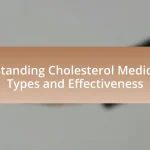Dietary supplements for cholesterol are products aimed at managing cholesterol levels in the body, with common types including omega-3 fatty acids, plant sterols, and soluble fiber. These supplements can lower LDL cholesterol and improve heart health, supported by various studies demonstrating their effectiveness. The article explores how these supplements interact with cholesterol metabolism, the evidence backing their use, potential risks, and the importance of lifestyle factors in enhancing their effects. Additionally, it provides guidance on choosing high-quality supplements and integrating them into daily routines for optimal cholesterol management.

What are Dietary Supplements for Cholesterol?
Dietary supplements for cholesterol are products designed to help manage cholesterol levels in the body. Common supplements include omega-3 fatty acids, plant sterols, and soluble fiber, which have been shown to lower LDL cholesterol and improve overall heart health. For instance, a study published in the Journal of the American College of Cardiology found that omega-3 fatty acids can reduce triglyceride levels, while plant sterols can lower LDL cholesterol by up to 10%. These supplements are often used alongside lifestyle changes, such as diet and exercise, to achieve optimal cholesterol management.
How do dietary supplements impact cholesterol levels?
Dietary supplements can significantly impact cholesterol levels by either lowering LDL (low-density lipoprotein) cholesterol or raising HDL (high-density lipoprotein) cholesterol. For instance, omega-3 fatty acids, commonly found in fish oil supplements, have been shown to reduce triglyceride levels and improve overall lipid profiles. A study published in the Journal of the American College of Cardiology found that omega-3 supplementation led to a 20-50% reduction in triglycerides in patients with high levels. Additionally, soluble fiber supplements, such as psyllium, can lower LDL cholesterol by binding to bile acids in the intestine, which was supported by research in the American Journal of Clinical Nutrition that indicated a reduction of 5-10% in LDL levels with daily fiber intake. Thus, specific dietary supplements can effectively modify cholesterol levels, contributing to cardiovascular health.
What are the primary types of dietary supplements used for cholesterol management?
The primary types of dietary supplements used for cholesterol management include omega-3 fatty acids, plant sterols, soluble fiber, and red yeast rice. Omega-3 fatty acids, found in fish oil, have been shown to lower triglyceride levels and improve overall heart health. Plant sterols and stanols, which are naturally occurring substances in plants, can help reduce LDL cholesterol levels by blocking its absorption in the intestines. Soluble fiber, present in foods like oats and beans, can also lower cholesterol by binding to it in the digestive system. Red yeast rice contains monacolin K, which is similar to the active ingredient in some cholesterol-lowering medications, and has been shown to effectively reduce LDL cholesterol levels.
How do these supplements interact with the body’s cholesterol metabolism?
Dietary supplements interact with the body’s cholesterol metabolism by influencing lipid levels, absorption, and synthesis. For instance, plant sterols and stanols reduce cholesterol absorption in the intestines, leading to lower LDL cholesterol levels. Omega-3 fatty acids, found in fish oil, can decrease triglyceride levels and improve overall lipid profiles. Additionally, soluble fiber supplements, such as psyllium, bind to bile acids in the intestine, promoting their excretion and subsequently lowering cholesterol synthesis in the liver. These mechanisms are supported by studies showing that regular intake of these supplements can lead to significant reductions in total and LDL cholesterol levels, thereby improving cardiovascular health.
What evidence supports the effectiveness of dietary supplements for cholesterol?
Dietary supplements such as plant sterols, omega-3 fatty acids, and soluble fiber have shown effectiveness in lowering cholesterol levels. For instance, a meta-analysis published in the American Journal of Clinical Nutrition found that plant sterols can reduce LDL cholesterol by an average of 10% when consumed at a dosage of 2 grams per day. Additionally, omega-3 fatty acids, particularly EPA and DHA, have been associated with a reduction in triglycerides, as evidenced by a study in the Journal of the American College of Cardiology, which reported a significant decrease in triglyceride levels among participants taking omega-3 supplements. Soluble fiber, found in supplements like psyllium husk, has also been shown to lower LDL cholesterol, with research in the Archives of Internal Medicine indicating a reduction of about 5% to 10% in LDL levels with daily intake. These findings collectively support the effectiveness of specific dietary supplements in managing cholesterol levels.
Which studies have shown positive results for specific supplements?
Several studies have shown positive results for specific supplements in managing cholesterol levels. For instance, a meta-analysis published in the American Journal of Clinical Nutrition in 2015 found that plant sterols can reduce LDL cholesterol by an average of 10% when consumed at doses of 2 grams per day. Additionally, a study in the Journal of Nutrition in 2016 demonstrated that omega-3 fatty acids significantly lowered triglyceride levels in patients with high cholesterol, with a reduction of up to 30% observed in participants taking 4 grams daily. Furthermore, research published in the Journal of the American College of Cardiology in 2017 indicated that red yeast rice, which contains monacolin K, effectively reduced total cholesterol and LDL cholesterol levels in individuals with hyperlipidemia. These studies collectively support the efficacy of these supplements in cholesterol management.
What are the limitations of current research on cholesterol supplements?
Current research on cholesterol supplements is limited by several factors, including small sample sizes, short study durations, and a lack of standardized formulations. Many studies do not include diverse populations, which affects the generalizability of the findings. Additionally, the variability in individual responses to supplements complicates the assessment of their efficacy. For instance, a meta-analysis published in the Journal of Clinical Lipidology in 2020 highlighted that many trials had methodological flaws, such as inadequate control groups and insufficient follow-up periods, which undermines the reliability of the results.
What are the potential risks associated with dietary supplements for cholesterol?
Dietary supplements for cholesterol can pose several potential risks, including adverse interactions with medications, liver damage, and gastrointestinal issues. For instance, supplements like red yeast rice, which contains a naturally occurring statin, can lead to muscle pain and liver toxicity, similar to prescription statins. Additionally, some supplements may interact negatively with blood thinners, increasing the risk of bleeding. A study published in the Journal of the American College of Cardiology highlighted that individuals taking cholesterol-lowering supplements should be cautious due to these interactions and potential side effects.
What side effects should users be aware of?
Users should be aware of potential side effects such as gastrointestinal issues, liver damage, and allergic reactions when taking dietary supplements for cholesterol. For instance, supplements like red yeast rice can cause muscle pain and liver enzyme elevation, while fish oil may lead to gastrointestinal discomfort and a fishy aftertaste. Clinical studies have documented these side effects, highlighting the importance of monitoring liver function and gastrointestinal health during supplementation.
How can interactions with medications affect cholesterol supplement use?
Interactions with medications can significantly affect cholesterol supplement use by altering the efficacy of the supplements or increasing the risk of adverse effects. For instance, certain cholesterol-lowering medications, such as statins, may interact with supplements like red yeast rice, which contains a natural statin-like compound, potentially leading to increased side effects such as muscle pain or liver damage. Additionally, supplements like fish oil can enhance the anticoagulant effects of blood thinners, raising the risk of bleeding. These interactions underscore the importance of consulting healthcare providers before combining cholesterol supplements with prescribed medications to ensure safety and effectiveness.

Which Dietary Supplements are Most Effective for Cholesterol Management?
The most effective dietary supplements for cholesterol management include plant sterols, omega-3 fatty acids, and soluble fiber. Plant sterols, found in fortified foods and supplements, can lower LDL cholesterol levels by blocking its absorption in the intestines, with studies showing a reduction of 5-15% in LDL cholesterol when consumed in adequate amounts. Omega-3 fatty acids, primarily from fish oil, have been shown to lower triglycerides and may improve overall heart health, supported by research indicating a reduction in triglyceride levels by 20-50% with regular intake. Soluble fiber, found in oats, barley, and psyllium, can also effectively lower cholesterol levels by binding to cholesterol in the digestive system, with clinical trials demonstrating a decrease in total cholesterol by 5-10% when consumed daily.
What are the top dietary supplements recommended for lowering cholesterol?
The top dietary supplements recommended for lowering cholesterol include plant sterols, omega-3 fatty acids, and soluble fiber. Plant sterols, found in fortified foods and supplements, can reduce LDL cholesterol levels by blocking its absorption in the intestines. Omega-3 fatty acids, commonly sourced from fish oil, have been shown to lower triglycerides and improve overall heart health. Soluble fiber, present in oats, barley, and psyllium, helps reduce cholesterol absorption in the bloodstream. Studies indicate that these supplements can effectively contribute to cholesterol management when combined with a healthy diet and lifestyle.
How does Omega-3 fatty acid supplementation affect cholesterol levels?
Omega-3 fatty acid supplementation can lower triglyceride levels and may slightly increase HDL (high-density lipoprotein) cholesterol, often referred to as “good” cholesterol. Research indicates that omega-3 fatty acids, particularly EPA and DHA found in fish oil, can reduce triglycerides by 20-50% in individuals with high levels. A meta-analysis published in the Journal of the American College of Cardiology found that omega-3 supplementation is associated with a modest increase in HDL cholesterol, which is beneficial for cardiovascular health.
What role does plant sterols and stanols play in cholesterol reduction?
Plant sterols and stanols play a significant role in cholesterol reduction by inhibiting the absorption of cholesterol in the intestines. These compounds, which are structurally similar to cholesterol, compete with dietary cholesterol for absorption in the digestive system, leading to a decrease in the amount of cholesterol that enters the bloodstream. Research indicates that consuming 2 grams of plant sterols or stanols daily can lower LDL cholesterol levels by 5% to 15%. This effect has been supported by various studies, including a meta-analysis published in the American Journal of Clinical Nutrition, which found that plant sterols and stanols effectively reduce LDL cholesterol levels in individuals with elevated cholesterol.
How do lifestyle factors influence the effectiveness of these supplements?
Lifestyle factors significantly influence the effectiveness of dietary supplements for cholesterol management. Factors such as diet, physical activity, smoking, and alcohol consumption can enhance or diminish the benefits of these supplements. For instance, a diet high in saturated fats can counteract the cholesterol-lowering effects of supplements like omega-3 fatty acids or plant sterols. Conversely, a balanced diet rich in fruits, vegetables, and whole grains can optimize the efficacy of these supplements. Additionally, regular physical activity has been shown to improve lipid profiles, thereby complementing the action of cholesterol-lowering supplements. Research indicates that individuals who maintain a healthy lifestyle experience greater reductions in LDL cholesterol levels when using supplements compared to those with poor lifestyle habits.
What dietary changes can enhance the effects of cholesterol supplements?
Incorporating a diet rich in soluble fiber, healthy fats, and plant sterols can enhance the effects of cholesterol supplements. Soluble fiber, found in oats, beans, and fruits, helps lower LDL cholesterol levels by binding to cholesterol in the digestive system. Healthy fats, such as those from avocados, nuts, and olive oil, can improve overall heart health and support the efficacy of cholesterol-lowering supplements. Additionally, plant sterols, present in fortified foods, can further reduce cholesterol absorption in the intestines, complementing the action of supplements. Studies indicate that a combination of these dietary changes can lead to a more significant reduction in cholesterol levels when used alongside supplements.
How does physical activity impact cholesterol levels alongside supplements?
Physical activity positively impacts cholesterol levels by increasing high-density lipoprotein (HDL) cholesterol and lowering low-density lipoprotein (LDL) cholesterol. Regular exercise enhances the body’s ability to metabolize fats and improves overall cardiovascular health. Studies indicate that moderate-intensity aerobic exercise can lead to a significant reduction in total cholesterol levels, with a reported decrease of 5-10% in LDL cholesterol among individuals who engage in consistent physical activity. When combined with cholesterol-lowering supplements, such as omega-3 fatty acids or plant sterols, the effects can be synergistic, further improving lipid profiles. For instance, a study published in the Journal of Clinical Lipidology found that individuals who exercised regularly and took omega-3 supplements experienced greater reductions in triglycerides compared to those who only exercised or only took supplements.

What Should Consumers Consider When Choosing Cholesterol Supplements?
Consumers should consider the specific ingredients, dosage, and clinical evidence supporting cholesterol supplements when making a choice. Ingredients such as plant sterols, omega-3 fatty acids, and soluble fiber have been shown to effectively lower cholesterol levels. For instance, a study published in the American Journal of Clinical Nutrition found that plant sterols can reduce LDL cholesterol by 5-15% when consumed in adequate amounts. Additionally, consumers should evaluate the dosage recommendations on the label and ensure they align with clinical guidelines. It is also important to check for third-party testing to verify the supplement’s purity and potency, as this can impact its effectiveness.
How can consumers identify high-quality dietary supplements?
Consumers can identify high-quality dietary supplements by looking for products that have been tested for purity and potency by third-party organizations. Certifications from reputable entities such as the United States Pharmacopeia (USP), NSF International, or ConsumerLab indicate that the supplements meet specific quality standards. Additionally, consumers should check for clear labeling that includes ingredient lists, dosage information, and any potential allergens. Research shows that supplements with these certifications are more likely to contain the ingredients listed on the label and be free from harmful contaminants, thus ensuring safety and efficacy.
What certifications or labels should consumers look for?
Consumers should look for certifications such as the United States Pharmacopeia (USP) Verified Mark, NSF International Certified for Sport, and ConsumerLab Approved Quality Seal when selecting dietary supplements for cholesterol. These certifications indicate that the products have been tested for quality, potency, and purity, ensuring they meet specific standards. For instance, the USP Verified Mark signifies that the supplement contains the ingredients listed on the label in the declared potency and amounts, while NSF International’s certification ensures that the product is free from banned substances and contaminants. ConsumerLab’s seal indicates that the product has passed rigorous testing for quality and efficacy.
How can ingredient transparency affect supplement choice?
Ingredient transparency significantly influences supplement choice by enabling consumers to make informed decisions based on the safety and efficacy of the ingredients. When supplement labels clearly disclose all components, including their sources and concentrations, consumers can assess potential allergens, interactions with medications, and the overall quality of the product. Research indicates that 73% of consumers prefer brands that provide detailed ingredient information, as this transparency builds trust and encourages purchases. Furthermore, studies show that consumers are more likely to choose supplements with transparent labeling, as they perceive these products to be more reliable and effective in managing health conditions, such as cholesterol levels.
What are the best practices for using dietary supplements for cholesterol?
The best practices for using dietary supplements for cholesterol include consulting a healthcare professional before starting any supplement regimen, selecting supplements with proven efficacy such as omega-3 fatty acids, plant sterols, and soluble fiber, and adhering to recommended dosages. Research indicates that omega-3 fatty acids can lower triglyceride levels, while plant sterols can reduce LDL cholesterol by up to 10%. Additionally, monitoring cholesterol levels regularly and maintaining a balanced diet alongside supplements is crucial for optimal results.
How should supplements be integrated into a daily routine for maximum benefit?
Supplements should be integrated into a daily routine by taking them consistently at the same time each day, ideally with meals to enhance absorption. For example, omega-3 fatty acids are best absorbed with dietary fats, while certain vitamins like A, D, E, and K require fat for optimal utilization. Research indicates that consistent timing and pairing with food can significantly improve the bioavailability of these nutrients, leading to better health outcomes.
What common mistakes should be avoided when using cholesterol supplements?
Common mistakes to avoid when using cholesterol supplements include not consulting a healthcare professional before starting supplementation, which can lead to inappropriate use or interactions with medications. Additionally, individuals often overlook the importance of lifestyle changes, such as diet and exercise, which are crucial for managing cholesterol levels effectively. Another mistake is relying solely on supplements without monitoring cholesterol levels through regular blood tests, as this can result in a lack of awareness regarding the effectiveness of the supplements. Lastly, consumers frequently choose low-quality supplements that may not contain the advertised ingredients or dosages, undermining their potential benefits.
What are practical tips for managing cholesterol effectively?
To manage cholesterol effectively, individuals should adopt a heart-healthy diet, engage in regular physical activity, and maintain a healthy weight. A heart-healthy diet includes consuming more fruits, vegetables, whole grains, and healthy fats while reducing saturated and trans fats. Research indicates that diets high in soluble fiber, such as oats and beans, can lower LDL cholesterol levels. Regular physical activity, such as 150 minutes of moderate exercise per week, can help raise HDL cholesterol and lower LDL cholesterol. Additionally, maintaining a healthy weight can significantly impact cholesterol levels, as losing even a small amount of weight can improve cholesterol profiles.









